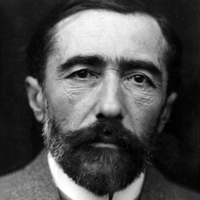Use of Irony in Heart of Darkness
Joseph Conrad has used a figurative device, irony, to cater the hidden meaning in the novella Heart of Darkness. When there is the contrast between what is said and what actually is, then the situation is said to be ironic. Whenever the irony is used, it heightens the degree of effect: sometime the comic effect and sometimes the tragic effect.

Joseph Conrad (1857-1924)
There are many ironies in the novel, but the greatest and noteworthy irony is the conversion of Kurtz in the Congo. Kurtz was an intelligent agent of the Company who once wrote a pamphlet stating the formative role the whites that they can play in the interior of Africa. As per him, the whites can suppress the savages, their brutal customs of killing human beings, and their way of living and can civilize the backward people. Here, he held a very high and progressive concept about taming the cannibals. But we see at the end of the novel, “Exterminate all the brutes” written at the end of the pamphlet. Here lies the irony, that at first what he wrote about the constructive role of whites contradicts with the statement. Similarly, Kurtz is expected to civilize the savages because he is thought to be one of the great people having moral restraint. However, just the opposite happens in the novel, in place of civilizing the brutes, he himself has become a savage. While dealing with the whites he behaves normally, but when he returns to the interior, he finds himself one of them and becomes a savage. Later on, he becomes so powerful, dominating all the savages that he is worshipped as a god. He starts following the night rituals that ends with the beheading of many savages and cruel raids for the ivory. Kurtz cannot control his moral self. He forgets the demarcation line of civilized man and a savage. He went there to transform the savages, but he himself is transformed. In this way, Kurtz’s transformation into savage is one great irony of this novel.
Another significant irony is Marlow’s ultimate reactions to Kurtz. At the beginning of the novel, Marlow gets many information about Kurtz and he forms an attitude of disdain towards Kurtz. However, afterwards, he becomes his admirer and respects him. He has developed a strong feeling of friendship with him. He persuades Kurtz to return back to the city. He begins to cherish the cruel man who has turned into a savage. Marlow has started to see him as his own kin in terms of the primitiveness. Thus, another civilized and highly cultured man, Marlow, has also fallen a near prey to the influences of savagery. We expect Marlow to hold his hatred towards Kurtz till the end, but happens opposite to our hope.
There is irony in the attitude of Kurtz’s fiancée. She has been a great lover and devoted to her beloved Kurtz. She feels proud that her lover is in the great mission to civilize the savages. She has harbored a highest degree of respect for her lover whom she worships like a god. When she knows about the death of Kurtz, her grief overpowers her. Marlow goes to see her after one year of Kurtz’s death, and still he finds her in mourning. She speaks of high words for him. The irony in this case lies in the fact that, the man she loves and still adores had become a devil in the process of civilizing the savages. The irony becomes higher when Marlow says that his last words had been her name which was a white lie. The last words of Kurtz were “Horror, Horror”.
The adoration of Kurtz by the Russian is very ironical. According to the description of Marlow, Kurtz has become a devil, living among the savages he has been no less than them. But for the Russian, he is a hero of great worth. The Russian says that Kurtz has enlarged his mind and can teach to see the essence of the things in a different way. As per the Russian, Kurtz possesses a hidden wisdom which enlightens him. It is so ironical that a man who is by all means a devil can illuminate the Russian.
In this way, the novel Heart of Darkness possesses many ironies to heighten the degree of feeling, of sorrow when there is an unexpected transformation of Kurtz, when the white fiancée goes on believing that her lover is noble and praiseworthy and when we find Marlow praising Kurtz despite his devilish nature.
Literary Spotlight
Introduction of Heart of Darkness
Exploration of Evil in Heart of Darkness
Kurtz's fall in Heart of Darkness
Relation between Colonizer and Colonized
Symbolism of Light and Darkness in Heart of Darkness
Heart of Darkness is Essentially a Journey Within
Use of Narrative Technique in Heart of Darkness
Significance of the Title Heart of Darkness
 |
bachelorandmaster.com |